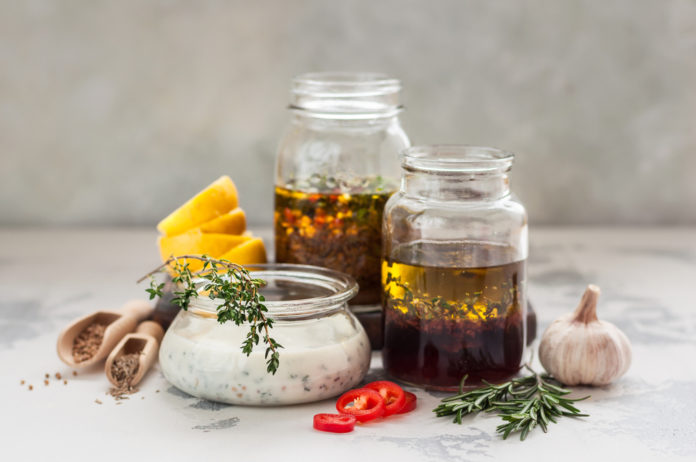The Components of a Marinade
Fats
Don’t fear the fat! It plays an integral role in marinating, as fats and oils retain and add moisture to the meats, while neutralizing flavors of additional acids and seasonings. Olive and canola oils, full-fat yogurt, and coconut milk are commonly used in marinades.
Acids
The inclusion of acid tenderizes the meat by breaking down its connective tissue. The acidity of lemon, lime, and orange juices are regularly used in marinades, while vinegar, wine, and tomatoes are also valuable additions.
Herbs and Spices
The use of herbs and spices truly sets marinades apart from one another, while also offering beneficial nutrients to your meal. Commonly used dried and fresh seasonings include basil, cilantro, crushed red pepper, garlic, onion, and shallots. Salt also contributes to a juicier and more flavor end product.
Sugars
Though not always featured, some marinades contain some sort of sugar to neutralize the acid and caramelize the meat. Widely used sugars include brown sugar, agave, maple syrup, molasses, and honey. *Must be used under a lower cooking method, as high-heat may burn and result to an undesirable flavor.*
Marinating Tips and Advices
- The fat to acid ratio of marinades is generally two or three parts fat to one-part acid. It is important to note too much acid or too much exposure time can cause a mushy texture, especially if the cut of meat is tender.
- For a one to two cup marinade, you should not need more than one to two tablespoons of sugar if using.
- Marinade beef at least overnight, or 24 to 48 hours, in the fridge.
- Before cooking, take beef out of the fridge and allow to a sit for an hour. Shake off the excess marinade and begin the preferred cooking process.
6 Beef Marinade Recipes
Recipes yield approximately 1 to 2 cup(s) of marinade and produce about two pounds of beef.
1. Simple Beef Marinade
¼ cup each of olive oil, balsamic vinegar, Worcestershire sauce, and soy sauce and 2 teaspoons each of Dijon mustard, garlic, and onion powders
- Suggested Serving: Serve with garlicky roasted broccoli or simply pair with eggs in the morning (or anytime) hours.
2. Basic BBQ Marinade
1 cup of favorite BBQ sauce, ¼ cup soy sauce, 2 tablespoons Worcestershire sauce, 1 tablespoon olive oil, and salt, pepper, and hot sauce to taste
- Suggested Serving: Pair with these glorious grilled potatoes and this purple cabbage and apple slaw.
3. Carne Asade Marinade
1 cup orange juice, ¼ cup each of lemon and lime juices, ½ cup olive oil, 1 tablespoon of finely chopped jalapeno, 1 tablespoon each of chili powder, ground cumin, and paprika, and 1 bunch of finely chopped fresh cilantro
- Suggested Serving: Fill carne asade into tortilla shells and garnish with chopped avocado and freshly squeezed lime juice.
4. Coconut-Lime Marinade
1 cup coconut milk, 2 tablespoons soy sauce, 1 tablespoon sesame oil, 1 tablespoon brown sugar, and freshly squeezed lime juice from half a lime
- Suggested Serving: Top onto a Thai salad, including fresh arugula, kale, edamame, carrots, bell peppers, and chopped cilantro leaves and peanuts.
5. Indian-Style Spicy Yogurt Marinade
1 cup full-fat plain yogurt, ¼ cup fresh lemon juice, 2 tablespoons olive oil, 2 finely chopped garlic cloves, and 1 teaspoon each fresh mint, ground ginger, turmeric, and salt and pepper
- Suggested Serving: Pair with basmati rice and this Indian-style cauliflower recipe.
6. Korean BBQ Marinade
¾ cup soy sauce, ½ cup chopped scallions, 2 crushed garlic cloves, 1 tablespoon brown sugar, 1 tablespoon sesame oil, 1 teaspoon freshly ground ginger and crushed red pepper
- Suggested Serving: Feature the Korean BBQ beef in Bibimbap, pairing with white sticky rice, a soft-boiled egg, mushrooms, carrots, cucumbers, and bean sprouts.









